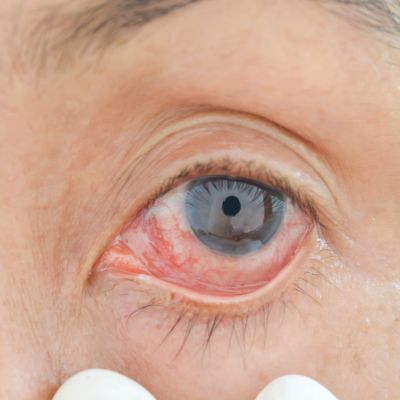If you live in East Tennessee and suffer from seasonal allergies, you’re used to:
- Watery or itchy eyes

- Sneezing
- Congestion
- A stuffy nose
Unsurprisingly, Knoxville is one of the worst places to live if you have spring allergies. Our region increases allergy symptoms for many reasons, including a concentration of:
- Trees
- Grass
- Weeds
- Flowers
The terrain also encourages pollen and pollutants to settle in the valley. It acts like a cradle for allergens for roughly 3 seasons of the year.
In the spring, tree pollen is leading the allergy parade. In the summer, grass pollens will kick into gear. It’s mold and weeds during late summer through fall that trigger allergies for many of us.
Dr. Travis Thompson and Dr. Catherine Abbott, our expert optometrists at Hardin Valley Eyecare & Optical, have tips for identifying seasonal allergies and helping you feel better. Contact us if you suspect seasonal allergies are impacting your quality of life.
Symptoms Of Spring Allergies
If you have spring allergies, you may experience a runny nose along with any of these eye symptoms:
- Redness
- Itchiness
- Dryness
- Tearing
- Swelling around the eyelids
- Light sensitivity
It’s helpful to recognize these common eye allergy symptoms. However, it can be difficult to spot allergies versus other conditions. This is because symptoms may overlap. Allergies are diagnosed by examining the conjunctiva. It’s a membrane covering the front of your eye and the inside of your eyelids. A lot of little bumps in your eyelids (papillae) indicate eye allergies.
You should know that it’s possible to have both eye allergies and dry eye syndrome, which we can also test for. This allows us to recommend the most effective treatment for both conditions. It helps alleviate allergic reactions and improves comfort during the spring and summer.
Tips To Soothe Your Eyes During Allergy Season
1. Use The Right Eye Drops
Many over-the-counter (OTC) eye drops claim to relieve eyes suffering from:
- Allergies
- Dry eyes
- An eye infection
- Lack of sleep
Eye drops can provide a great deal of relief, but you need to be careful about which you choose. Artificial tears, which may be labeled “lubricating,” help remove allergens from your eyes. These are safe to use as long as they are solely “lubricating” drops. These eye drops will often say “preservative-free” on the packaging.
You may also want to use over-the-counter allergy eye drops or oral antihistamines. Dr. Thompson recommends Pataday. It previously required a prescription but has been approved as an OTC by the FDA. It requires one drop a day. Other drops that can be effective are Allaway or Aaditor but require using the drops twice a day
Call us If you feel OTC eye drops or oral antihistamines aren’t helping you sufficiently. You may need a prescription for stronger medication that will provide more relief.
2. Limit Exposure To Allergens
Pollen is a major allergy trigger so be aware of the pollen count in your area. Limit your time outdoors when they’re at their highest. This is usually mid-morning and early evening. You can use weather apps and websites to stay aware if the pollen count is high on any given day. On those days, try to stay indoors as much as possible.
In your home, it can be helpful to use high-quality air filters for your air conditioning system that trap allergens. It’s important to replace the filters as instructed by the manufacturer. Keep your windows closed and use air conditioning at home and in your car to limit pollen exposure.
When you do go outdoors, wear wraparound sunglasses to keep pollen away from your eyes. This is true even if it’s cloudy since allergens don’t go underground just because it’s not sunny.
3. Try Cleanses & Compresses
Avoid rubbing your eyes if they’re irritated since it can make your symptoms worse. Rubbing your eyes releases more histamine, which is what causes your eyes to feel dry, itchy, or watery.
Instead, cleanse your eyelids and lashes with a warm washcloth. Do this any time after you’ve been outdoors and before bed. It will remove pollen that could cause irritation while you sleep.
Applying a cold compress to your eyes can also bring a surprising amount of relief. After using a warm washcloth, use a clean one dampened with cold water. This should help to reduce eye itchiness and swelling.
4. Manage Or Limit Contact Lens Use
Consider removing your contacts and wearing glasses more often during peak allergy season. Airborne allergens can get trapped between your lenses and the surface of your eye. They can also accumulate on the surface of contact lenses.
If you wish to continue wearing your contacts, be sure to remove them and thoroughly clean them daily. You can also switch to daily lenses so allergens never have an opportunity to gather on your lenses.
Do you need help alleviating your spring allergy symptoms in Knoxville, TN? Contact us today to schedule an appointment!
Spring allergies show up with eye issues like redness, itching, dryness, and tearing. They’re diagnosed by checking the conjunctiva. Ease symptoms by using eye drops, avoiding the outdoors during high pollen counts, and wearing sunglasses outside At home, you can install high-quality air filters, clean your eyelids, and apply cold compresses. You can also minimize contact lens use to reduce allergen exposure. If non-prescription treatments don’t help, prescription eye drops or other meds may be needed.
Hardin Valley Eyecare & Optical has been serving Knoxville since 2009. Located at 10904 Spring Bluff Way, you can schedule an appointment online or call us at (865) 888-0892.
Editor’s Note: This blog has been updated since it was originally published in April of 2020





